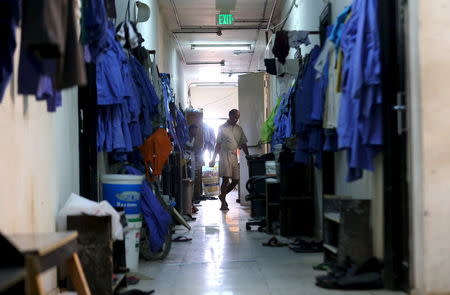Amnesty report says Qatar still failing migrant workers

BERNE/DOHA (Reuters) - Qatar, host of soccer's 2022 World Cup, is doing little to improve conditions for its 1.5 million migrant workers despite promising reforms last year, Amnesty International said on Thursday. Qatar's Ministry of Labour and Social Affairs said several of the allegations in Amnesty's report were inaccurate and that "significant changes have been made over the last year to improve the rights and conditions of expatriate workers." Amnesty researcher Mustafa Qadri told reporters: "Without prompt action, the pledges Qatar made last year are at serious risk of being dismissed as a mere public relations stunt to ensure the Gulf state can cling on to the 2022 World Cup. "In practice, there have been no significant advances." Qatar unveiled reform plans a year ago including proposals to change laws which bind workers to their employers and force them to seek permission to change jobs or leave the country, and to improve living and working conditions. The ministry said Qatar had launched a wage protection system, an electronic payment system to ensure wages are paid on time and increased the number of labour inspectors. It said more accommodation was being built for more than 250,000 migrant workers, many attracted by the pre-tournament construction boom. But Amnesty said the proposed electronic payment system was still being implemented and many migrants interviewed "complained of late or non-payment of wages." The human rights group said Qatar had also failed to meet its target of having 300 labour inspectors in place by the end of last year. "There has been only limited progress on measures to improve safety on construction sites, regulate exploitative recruitment agencies and improve access to justice for victims of labour exploitation," said the report. Amnesty said soccer's governing body FIFA had a "clear responsibility" to put pressure on Qatar to do more. "(FIFA) has yet to demonstrate any real commitment to ensuring Qatar 2022 is not built on a foundation of exploitation and abuse," Qadri said. FIFA said it had "repeatedly urged" Qatar to ensure fair working conditions for all workers, and said: "It is clear that the FIFA World Cup is serving as a catalyst for significant change. The FIFA World Cup stadium sites, where none of the incidents mentioned in the report took place, are subject to international standards required of the construction companies responsible and their supply chains." It's statement added: "Amnesty’s report acknowledges that there has been some progress and it also makes clear much more needs to be done." A statement from Qatar's Supreme Committee (SC) for Delivery & Legacy, in charge of organising the 2022 games, said its staff had helped raise money for Nepali workers to return home after the April 25 earthquake killed thousands of people. "The SC will continue to move forward... to deliver a FIFA World Cup that preserves the rights and dignity of all individuals who will work to make the tournament a success," it said. (Reporting by Brian Homewood in Berne and Amena Bakr in Doha; Editing by Janet Lawrence)

